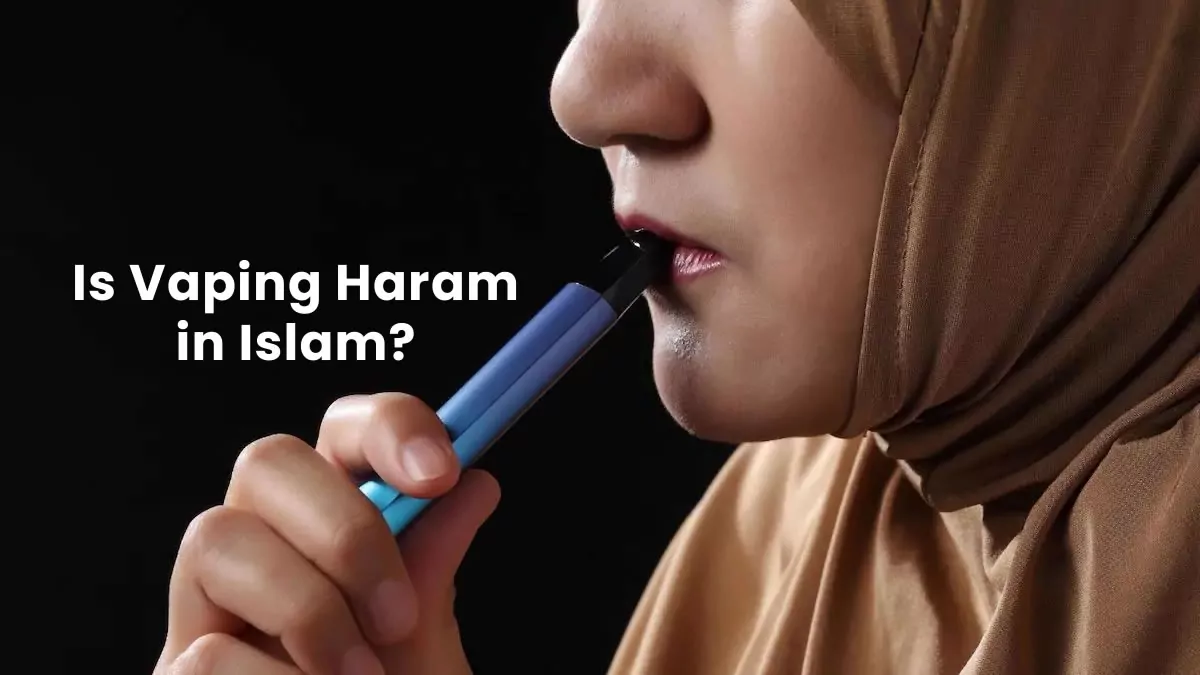Is Vaping Haram in Islam? A Comprehensive Analysis
The rise of vaping as a popular alternative to traditional smoking has sparked a significant debate within the Muslim community regarding its permissibility under Islamic law. This article aims to provide a thorough examination of the various Islamic perspectives on vaping, exploring the arguments presented by scholars and authoritative Islamic organizations based on fundamental Islamic principles and scholarly interpretations.
The Islamic Principles on Health and Harmful Substances
The sanctity of human life and the individual’s responsibility to protect their physical and mental well-being are central to the Islamic understanding of health. Several verses in the Quran serve as foundational principles for rulings concerning health and harmful substances1:
- Surah Al-Baqarah (2:195): “And do not throw yourselves into destruction by your own hands…”
- Surah An-Nisa (4:29): “…And do not kill yourselves [or one another]. Indeed, Allah is to you ever Merciful.”
- Surah Al-A’raf (7:31): “O children of Adam, take your adornment at every masjid, and eat and drink, but be not excessive. Indeed, He likes not those who commit excess.”
- Surah Al-A’raf (7:157): “…[The Prophet] commands them what is just, and forbids them what is evil; he allows them as lawful what is good, and prohibits them from what is bad…”
These verses emphasize the prohibition of actions that lead to self-harm, the importance of moderation, and the Prophet Muhammad’s role in delineating permissible and forbidden matters.
The teachings of Prophet Muhammad (peace be upon him), known as Hadith, also provide crucial guidance. A widely cited Hadith states, “There should be neither harming (darar) nor reciprocating harm (dirar) in Islam.” This principle directly prohibits any action that causes harm to oneself or others.

The Evolution of Islamic Rulings on Smoking
To understand the contemporary Islamic view on vaping, it is essential to examine the evolution of rulings on smoking. Initially, due to a lack of scientific understanding about its harms, there was ambiguity among scholars, with some considering it merely Makrooh (discouraged). However, with the accumulation of overwhelming scientific evidence demonstrating the detrimental health effects of smoking, a significant shift occurred towards its widespread condemnation as Haram (forbidden)2.
Numerous fatwas from prominent scholars and authoritative Islamic institutions now explicitly declare smoking as Haram, citing Quranic verses, Hadiths prohibiting harm, and the principle of avoiding wastefulness. These include rulings from:
- Al-Azhar University in Cairo
- The Grand Muftis of Egypt
- The Muslim World League
- The Grand Mufti of Oman
- The Grand Mufti of Saudi Arabia
- The Indonesian Ulema Council (MUI)
- The Malaysian National Fatwa Council
- The Perlis Fatwa Committee in Malaysia

The Islamic Perspective on Vaping
Contemporary Islamic scholars often draw a direct analogy between vaping and smoking. The arguments supporting this analogy are multifaceted3:
- Both activities involve inhaling substances into the lungs, which can potentially lead to respiratory problems and various other health issues.
- The majority of vaping products contain nicotine, the same highly addictive substance found in traditional cigarettes.
- Despite claims of reduced harm, there are significant concerns regarding the long-term health effects of vaping, which are still being investigated.
- There is apprehension that vaping might normalize smoking behavior and act as a gateway, particularly among young individuals, to the use of traditional cigarettes, which are widely considered forbidden.
- Given the ongoing uncertainty surrounding the long-term effects of vaping, some scholars advocate for adhering to the principle of avoiding doubtful matters, choosing to abstain from vaping as a precautionary measure.
The reasoning presented by scholars and Islamic organizations who consider vaping Haram (forbidden) is comprehensive4:
- Vaping is linked to various health risks, including lung irritation, respiratory problems, cardiovascular issues, and exposure to harmful chemicals.
- The presence of nicotine in most vaping products and its highly addictive nature are significant concerns, as addiction to harmful substances is discouraged in Islam.
- Vaping can act as a gateway, especially for young individuals, to initiate smoking traditional cigarettes, which are widely considered Haram.
- Exposure to secondhand vapor still presents potential risks and can be bothersome to others, violating the Islamic principle of not causing harm or distress to others.
- Spending money on vaping products, which offer no essential benefit and carry potential health risks, can be considered a wasteful expenditure of resources, a practice discouraged in Islam.
- Vaping might be viewed as an imitation of harmful trends prevalent in non-Muslim cultures, which Islam generally advises against.

| Organization | Region | Ruling on Vaping | Key Reasoning |
|---|---|---|---|
| Malaysian National Fatwa Council | Malaysia | Haram | Harmful health effects, bad smell. |
| Perlis Fatwa Committee | Malaysia | Haram | Harmful to oneself and others. |
| Indonesian Ulema Council (MUI) | Indonesia | Likely Haram | Ruled smoking in public Haram, general smoking Makrooh; Muhammadiyah explicitly Haram for vaping. |
| Muhammadiyah | Indonesia | Haram | Categorized as a form of consumption that can damage or endanger. |
| Iftaa’ Department | Jordan | Prohibited | Contains poisonous materials that destroy health. |
| British Fatwa Council | UK | Likely Haram | Ruled smoking Haram due to severe health risks ; similar reasoning likely applies to vaping. |
| Grand Mufti of Saudi Arabia | Saudi Arabia | Likely Haram | Ruled smoking impermissible due to health concerns ; similar reasoning likely applies to vaping. |
| Al-Azhar University | Egypt | Likely Haram | Ruled smoking Haram ; analogy likely extends to vaping. |
| Grand Ayatollah Sayyid Ali Husseini Sistani (Shia) | Iraq (Global) | Haram (if harmful) | Smoking (and by extension, likely vaping) is Haram if proven seriously harmful to health. |
Nuances in Islamic Rulings on Vaping
While the dominant scholarly view leans towards considering vaping, especially with nicotine, as impermissible, there are some nuances in the Islamic rulings on vaping5:
- The presence or absence of nicotine significantly impacts the ruling. Vaping with nicotine strengthens the arguments for prohibition due to its addictive nature and potential health risks. In contrast, the ruling on nicotine-free vaping is more complex. If it can be definitively proven to be free of harmful chemicals and is used without the intention of imitating smokers or engaging in wasteful behavior, some scholars might consider it permissible or merely disliked.
- Some scholars argue that for individuals already addicted to smoking, switching to vaping could be a permissible form of harm reduction, provided the ultimate goal is to cease nicotine use entirely. However, this view is contingent on verifiable proof of the absence of harmful chemicals, which can be challenging to ascertain.
- Historically, the Hanafi school of thought classified smoking as Makrooh rather than Haram due to the lack of explicit prohibition and less conclusive evidence of harm at the time. Some scholars within this school might initially extend this view to vaping, particularly if nicotine is absent and harm is perceived as minimal. However, it is important to note the increasing trend even within the Hanafi school towards considering smoking Haram due to modern scientific evidence.
Vaping during Ramadan
The Islamic ruling on vaping during the fast in the month of Ramadan is clear. The majority of Islamic scholars consider vaping to invalidate the fast, regardless of whether the vape contains nicotine or not. This is because vaping involves inhaling substances into the body, which is considered a form of consumption, even if it is not nutritional. The presence of nicotine, a stimulant, is an additional reason cited by some scholars for breaking the fast. Even for nicotine-free vaping, the act of inhaling vapor is generally regarded as a violation of the fasting state by most scholars.
Ecigator is one of the well-known vape brands spun off from FM Technology Co., Ltd, it’s an ISO-certified disposable vape manufacturer for OEMs, ODMs, and OBM since 2010. The founder team comes from top firms with more than 10 years of experience in the vaping industry and has devoted thousands of hours to providing users with a better and better experience.

18K Disposable Pod Kit
Disposable Pod Kit – 18ml changeable pod with 650mAh rechargeable battery.

35K with Large Screen
35000 Puffs Disposable Vape with 3D galaxy screen. Eco and Pulse working modes.

30K DTL Disposable
30K Puffs DTL(Directly to Lung) disposable vape with airflow control and screen.
Read more: Can you vape while Ramadan fasting?
Conclusion
The dominant Islamic perspective on vaping, particularly when it involves nicotine, is that it is Haram (forbidden). This conclusion is primarily based on the well-established Islamic principles that prohibit self-harm and the consumption of harmful and addictive substances. The strong analogy drawn with the evolved rulings on smoking, which are now widely considered Haram due to conclusive scientific evidence of their detrimental health effects, further supports this view.
While some more nuanced opinions exist regarding nicotine-free vaping, where it might be considered Makrooh (discouraged) under specific conditions, the overarching guidance is towards abstention due to potential health risks and the act resembling smoking. Moreover, there is a strong consensus among scholars that vaping, regardless of its content, breaks the fast during Ramadan.
It is crucial for individual Muslims to seek guidance from reliable religious authorities and to prioritize their health and well-being in accordance with Islamic teachings. Ultimately, abstaining from vaping aligns with the fundamental Islamic principles of preserving life, protecting one’s health, avoiding harm to oneself and others, and using resources responsibly.
- Wikipedia, Islamic views on tobacco https://en.wikipedia.org/wiki/Islamic_views_on_tobacco ↩︎
- applications.emro.who.int, Islamic ruling on smoking https://applications.emro.who.int/dsaf/dsa46.pdf ↩︎
- The Islamic Ruling on E-Cigarettes, Vaping and Synthetic Marijuana https://www.almaghrib.org/2016/02/08/the-islamic-ruling-on-e-cigarettes-vaping-and-synthetic-marijuana/ ↩︎
- islamqa.info, Is Vaping Allowed? https://islamqa.info/en/answers/201512/is-vaping-allowed ↩︎
- A Visual Interpretation of the Haram Prohibition on Smoking and Vaping https://www.researchgate.net/publication/371283910_A_Visual_Interpretation_of_the_Haram_Prohibition_on_Smoking_and_Vaping_1995_2015_Fatwa ↩︎









